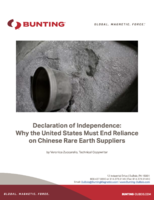Spray Coating increases thermowell life.
Share:
Press Release Summary:

Able to be applied in thicknesses exceeding 2.54 mm and up to 5.08 mm, SDC-4 plasma flame sprayed coating increases life of thermowells in critical Fluid Catalytic Cracking Units (FCCU) in oil refineries and also reduces associated maintenance/repair. Solution is applied to tip of thermowells, providing corrosion resistance in harsh operating temperatures and pressures. Coating does not alter/distort component or substrate.
Original Press Release:
Spray Coating Increases Life of Thermowells in Hydrocarbon Cracking Units
A spray coating for thermowell temperature assemblies has been developed that not only increases the life of thermowells in critical Fluid Catalytic Cracking Units (FCCU) in oil refineries, but also reduces associated maintenance and repair costs.
The SDC-4 plasma flame sprayed coating from Okazaki Manufacturing Company (OMC) is applied to the tip of the company's thermowells for use in oil refinery FCCU applications, providing excellent corrosion resistance in harsh operating temperatures and pressures. In a recent application at Fuji Oil Company in Japan, the SDC-4 plasma coating thickness on an FCCU thermowell tip had eroded by just 0.1mm during 51 months of operation. The thermowell was located in the reactor stripper riser extension of an FCCU, with operating temperatures of around 510 deg C and operating pressures of around 0.27Mpa. The thermowell was manufactured from Inconel600, had an outside diameter of 16mm, with an SDC-4 coating thickness of 2mm.
During the SDC-4 spray coating process, which is carried out at in-house by OMC, the component being coated (tip of the thermowell) is not distorted in any way. The part temperature is typically below 121 deg C during the spraying process and the substrate of the part being coated is not altered at all, as far as its metallurgical properties are concerned. The coating is applied to the exposed area of the thermowell (i.e. the tip) and provides excellent corrosion resistance against the arduous process conditions within the FCCU.
Chris Green, Sales Manager at OMC commented: "Virtually any material can be applied to any metal substrate and certain plastics, including ceramics, carbides, pure metals and alloy metals. Unlike plating applications that take hours to create a minimal build up, the application time for spray coating is very fast, which reduces downtime during repairs."
Coating thickness can exceed 2.54mm, with some materials able to be applied as high as 5.08mm thickness. "The SDC-4 flame sprayed coating increases component life, helping to extend the lifecycle of oil refinery equipment, therefore reducing maintenance costs. When necessary, the coating can be removed with virtually no degradation to the part base material, then reapplied to restore the component back into service. Finished parts are protected by masking, so that only the surface that requires coating build up is coated, with the rest of the part remaining free from any coating attachment." explains Chris Green.
FCCUs have been an integral part of oil refineries since 1942, when Exxon Corporation introduced them to the US market in response to a growing wartime need for hydrocarbon-based fuels. An FCCU accepts chains of hydrocarbons and breaks them down into smaller ones in a chemical process known as 'cracking'. This enables oil refineries to utilise their crude oil resources more efficiently, making more products such as gasoline for which there is a high demand.
Crude oil contains a wide variety of hydrocarbons of varying lengths. Depending on the length of the hydrocarbon, it can be used for a number of different applications. For example, cooking gas typically has four carbons, while gasoline for passenger cars has a longer chain that contains eight carbons. Lubricating oils are even longer, with 36 carbons in the hydrocarbon chain. When oil is refined, these hydrocarbons are separated out for use.
However, a barrel of crude oil will not always yield the desired ratio of hydrocarbons. For example, the market may be heavy for gasoline but light for lubricating oil. Rather than discard the lubricating oil, it is chemically cracked in an FCCU so that it can be turned into gasoline and other hydrocarbons with shorter chains. Hydrocarbons can be cracked in other ways, but chemical cracking in a FCCU is the most common and efficient method.
The FCCU uses a very high temperature catalyst to crack the hydrocarbons into shorter chains. Zeolite, bauxite, silica-alumina, and aluminium hydrosilicate are all catalysts commonly used in an FCCU. Both the oil and the catalyst in the FCCU are normally extremely hot and the oil is often in vapour form. The catalyst splits the long hydrocarbon chains into shorter units and the mixture travels from the FCCU to another distillation column, so that the cracked hydrocarbons can be extracted.
Catalysts can be reused for additional cracking once the carbon that coats them after the process has been removed. Today, FCCUs operate in a continuous cycling mode and are capable of processing tens of thousands of barrels of oil per day. A continuous FCCU has a primary reactor, a distillation column for separating out the cracked hydrocarbons, and a regeneration unit for cleaning the catalysts and preparing them for reuse. The use of an FCCU increases the yield and efficiency of an
oil refinery and for this reason has become an integral part of the petroleum processing industry.
For more information on OMC's range of temperature measurement products, please visit the website at www.okazaki-mfg.co.uk or contact the sales department on 02920 814361 or email: info@okazaki-mfg.co.uk
Okazaki Manufacturing Company (OMC) was founded in 1954 and started the design and manufacture of temperature-related products in Kobe, Japan. The company has always been at the forefront of product design and the use of innovative technology. In 1963, OMC developed Resiopak, a metal-sheathed MgO insulated resistance thermometer now used for temperature measurement within the petrochemicals industry globally.
Today, OMC designs and manufactures a wide range of reliable, high quality, high accuracy temperature measurement products. With a turnover in excess of 110 million USD, OMC is one of the largest manufacturers of mineral insulated (MI) thermocouple and RTD cable, which is the first building block of industrial temperature sensors. OMC operates from a series of specialist sales support offices worldwide, backed up by a team of local representative companies all with specialist instrumentation departments. OMC has manufacturing sites in Japan, USA and Taiwan.
All OMC's temperature products can be fully certified for use in potentially explosive atmospheres to International Standards and to country-specific variations. OMC temperature assemblies are certified by FM for NEC (USA) standards, BASEEFA for IECEx Product Approval and for type approval in compliance with EU ATEX directives. Country-specific approvals include GOST K, GOST R, NEPSI (China) and KOSHA (Korea).
Reader Enquiries/Advertising:
Chris Chant
Managing Director
Okazaki Manufacturing Company
Ashwood House,
66 Cardiff Road,
Glan-y-Llyn,
Taffs Well,
Rhondda Cynon Taff,
CF15 7AF
Tel: 02920 814361
Email: chris.chant@okazaki-mfg.co.uk
Web : www.okazaki-mfg.co.uk




